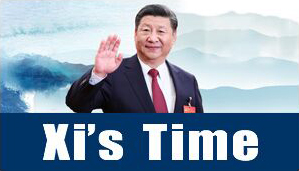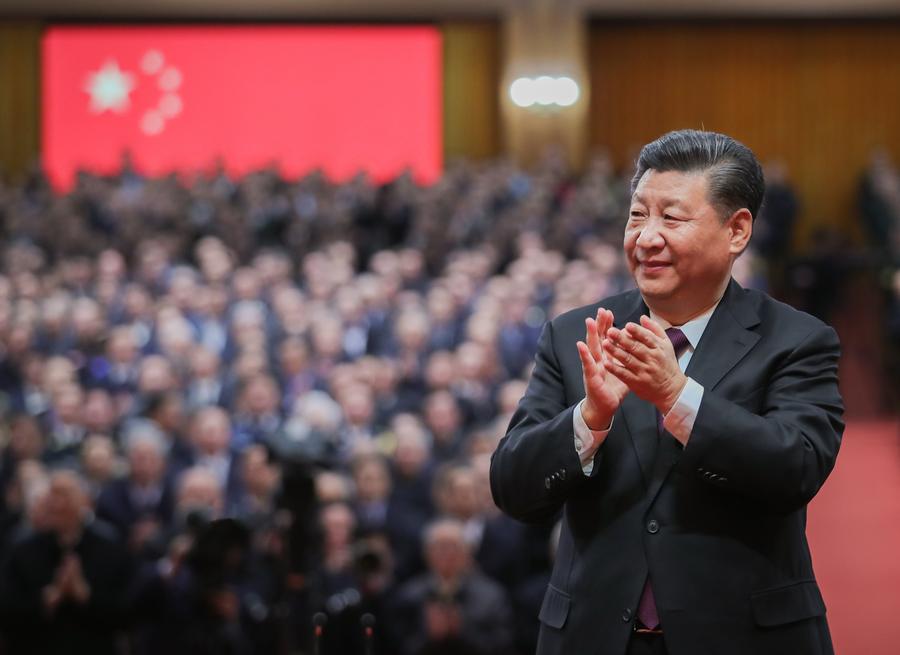
BEIJING, March 12 (Xinhua) -- Chinese leader Xi Jinping has sounded the clarion call for reform during the country's annual key political season, dispelling concerns about whether China's reform is "stagnating," or its economy is "losing steam."
"We must plan major moves to deepen reform to inject strong impetus into promoting high-quality development and advancing Chinese modernization," President Xi said at the annual sessions of China's top legislature and top political advisory body, or the "two sessions," which wrapped up on Monday.
Since Xi took the top office more than a decade ago, China has entered a "new era." The country's economic strength has grown, and its international influence has continued to rise. Reform is the hallmark of this era.
In the face of a myriad of challenges, China is now in a critical period for accelerating reform.
REFORM WILL NOT STOP, OPENING-UP WILL NOT CEASE
Xi is regarded as another outstanding reformer in the country after Deng Xiaoping.
The two leaders faced the same mission -- to modernize China, but against strikingly different backdrops.
When Deng launched the reform and opening-up drive in the late 1970s, China's per-capita GDP was only about 200 U.S. dollars. His push for reforms started almost from scratch.
In 2012, when Xi was elected general secretary of the Communist Party of China (CPC) Central Committee, China had become the world's second-largest economy, with a per-capita GDP of over 6,000 dollars. But growth was shifting gears and many advantages, including the once-low labor costs, had started to diminish.
Instead of resting on the laurels of his predecessors, Xi was committed to carrying on the reform, and he knew how hard it would be.
"The easy part of the job has been done to the satisfaction of all. What is left are tough bones that are hard to chew," he said.
Over the past decade, more than 2,000 reform measures have been rolled out, enabling the country to eliminate extreme poverty, promote integrated urban-rural development, fight corruption, support businesses, boost innovation, and push forward a "green revolution."
With the reform measures, the Chinese economy has not only sustained robust growth but also more than doubled since 2012, cementing the country's global status as a major growth contributor.
China is currently at a critical juncture, where Xi is leading the country to realize the ambitious "Chinese modernization," while being confronted with major challenges, such as downward economic pressure following the COVID-19 pandemic, rising protectionism and suppression from Western nations, and risks associated with the real estate sector, local government debts, and some small and medium-sized financial institutions.
Xi reiterated the significance of reform at a group study session of the Political Bureau of the CPC Central Committee earlier this year. Weeks later, at the "two sessions," he stressed deepening reforms in various sectors "to remove the barriers obstructing the development of new quality productive forces."
The crucial role of reform was also highlighted in this year's government work report.
It devoted a section to deepening reform, with a focus on improvements to systems underpinning the socialist market economy, such as property rights protection, market access, fair competition, and social credit. "Ultimately, high-quality development depends on reform," it wrote.
Looking back, Xi's commitment to reform has been consistent.
When he was not even 16, he was sent to Liangjiahe village in Shaanxi Province to do farm labor. There, he experienced hunger. Deng initiated reforms, believing that China could not remain poor. Xi's aspiration at that time was to ensure that his fellow villagers could have enough to eat.
Like Deng, Xi's drive for reform also stems from the people's aspiration for a better life. The reform measures he implemented in Liangjiahe, including introducing biogas, establishing a blacksmith shop and opening a store selling daily necessities, aimed at improving the livelihood of villagers.
Xi's commitment to reform was influenced by his father, Xi Zhongxun, a champion of reform and opening-up. In 1978, the senior Xi was sent to south China's Guangdong Province as a principal official, and later helped build the country's first special economic zones including Shenzhen.
Also in 1978, Xi Zhongxun entrusted Xi, who was studying at Tsinghua University, to conduct on-site research on the household contract responsibility system in Anhui Province. He filled an entire notebook with notes, a collection he preserved for many years.
Xi's reputation as a reformer was reinforced as his political career advanced.
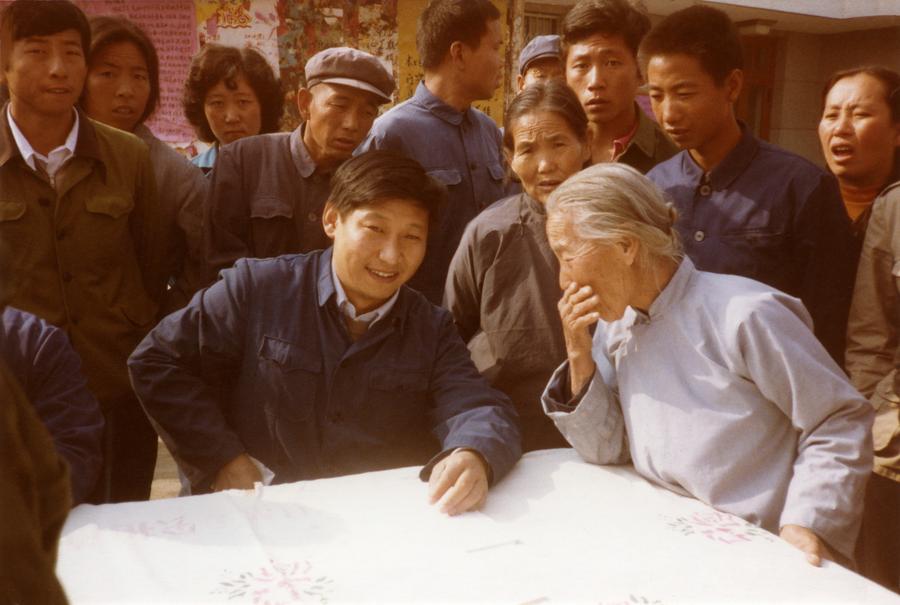
In the early 1980s, he initiated reform experiments in the impoverished county of Zhengding, Hebei Province, commencing with the rural land contract trial, making Zhengding the first in Hebei to adopt this practice already tested in southern provinces.
An article published in the "China Youth" magazine in 1985 described the county's transformation. It cited a county Party secretary from a neighboring province, who visited Zhengding, as saying: "Here, you don't hear people chanting 'reform,' but reform is happening everywhere."
"Looking back at those years, one of the things we achieved was liberating our thinking," Xi said, reflecting on the reforms in Zhengding.
After Zhengding, Xi was assigned to work in Xiamen, a special economic zone in Fujian Province, where Xi spearheaded the establishment of China's first joint-venture bank -- Xiamen International Bank. After he ascended to the position of governor of Fujian, Xi led reform in the collective forest tenure, which was later expanded nationwide. This initiative is known as another revolutionary step for China's rural areas after the household contract responsibility system.
During his time in Zhejiang Province, Xi proposed an innovative initiative to promote development through industrial upgrading. He actively supported private businesses, and encouraged business people to "come directly" to his office for important matters. He also extended reforms in Zhejiang beyond the economic sphere, addressing social, cultural, and ecological aspects.
Xi's reformer image left a deep impression on international figures. In September 2006, Henry Paulson, then U.S. treasury secretary, visited China and chose Hangzhou, capital city of Zhejiang, as his first stop. He regarded Xi as the "perfect choice" for his initial meeting in China, describing him as "the kind of guy who knows how to get things over the goal line."
Paulson later recounted that during a meeting with Xi in 2014, the Chinese leader stated, "My concern is mainly reform and related issues."
After assuming the Party's top post in 2012, Xi's first domestic inspection took him to Shenzhen, following in his father's footsteps. There, he laid a flower basket at the bronze statue of Deng Xiaoping in Lianhuashan Park, declaring a firm commitment to reform: "Reform will not stop, and opening-up will not cease!"
The Third Plenary Session of the 18th CPC Central Committee, convened in 2013 under Xi's leadership, is heralded as a milestone, much like Deng's Third Plenary Session of the 11th CPC Central Committee in 1978, which ushered in the era of reform. The 2013 event marked the dawn of a new era of reform.
During this session, Xi listed a series of challenges facing China's development, including corruption, unsustainable development, and environmental issues. He stressed that "the key to addressing these problems lies in deepening reform."
The session approved a decision on "major issues concerning comprehensively deepening reforms." A Spanish newspaper commented that Xi had initiated the most profound economic, social, and administrative reforms in China over 30 years.
More than a month later, China announced the decision to establish the Central Leading Group for Comprehensively Deepening Reform, which Xi headed. This marked the first time in the Party's history that a leadership body exclusively dedicated to reform was established at the central level. Later, this group evolved into the Central Commission for Comprehensively Deepening Reform, with Xi as its director.
VENTURING INTO THE MOUNTAIN DESPITE KNOWING THERE ARE TIGERS
The reforms led by Xi have been based on thoughtful considerations derived from his many years of practice, with a whole set of top-level designs.
He has invoked the ancient Chinese idiom of "discarding the outdated in favor of the new" to call for action, believing that reform and innovation are inherent cultural genes of the Chinese nation.
Xi has been clear-headed regarding the direction of reform. He has cautioned against copying the political systems of other countries, once saying that reform denying socialist orientation would only lead to a "dead end."
"What cannot be changed must be resolutely kept unchanged," he stated.
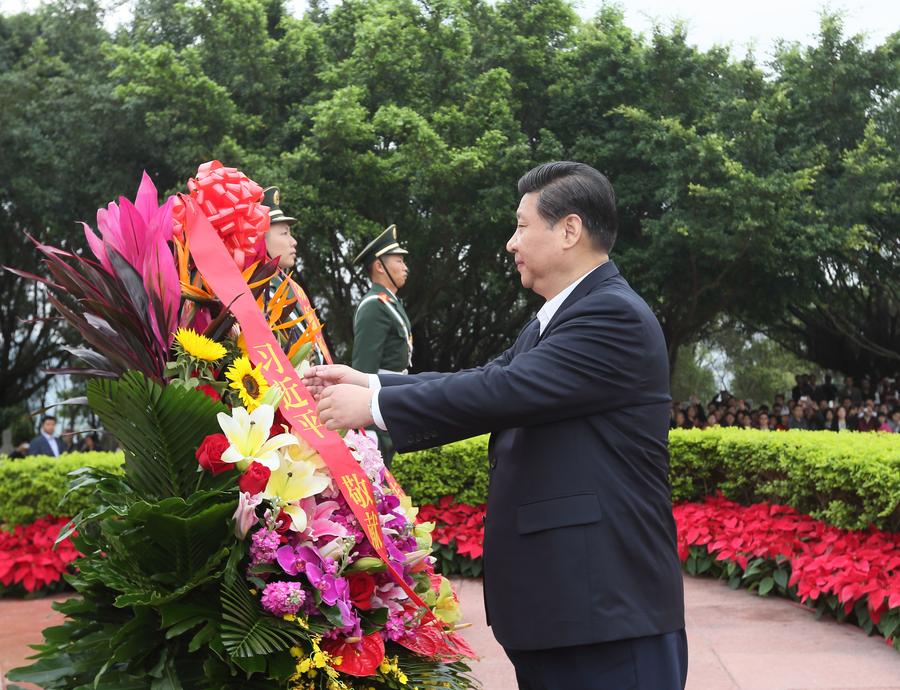
For what should be changed, Xi has demanded firm actions, urging creating conditions for reform even when they do not exist yet. The must-do tasks included eliminating all drawbacks that restrict the vitality of business entities and hinder the full play of the market.
With unprecedented scope, scale and intensity, Xi's reforms have covered economic, political, cultural, social, ecological and Party building fields.
He has developed a methodology for reform in the new era: "properly handling the relationships between emancipating the mind and seeking truth from facts, between advancing as a whole and making breakthroughs in key areas, between top-level design and crossing the river by feeling the stones, between being bold and maintaining a steady pace, as well as balancing reform, development, and stability."
He has stressed pursuing reform in a systematic, holistic, and coordinated way and respecting the pioneering spirit of the people. Officials have also been told to "establish the new before abolishing the old" and ensure proper timing and intensity of reform to good effect.
"He corrected the mentality of measuring the success of development simply by GDP growth and enabled the reform to truly touch the interests of some people," said an official from Shaanxi.
He recalled that Xi had issued six instructions to crack down on illegal villa construction by officials in collusion with businesses in the nature reserves of the Qinling Mountains. It reflected the local resistance encountered by the reform in the ecological field back then.
Xi has been pushing through reform in adversity and had to break the blockades of vested interests. "We need the courage to 'venture into the mountain despite knowing full well there are tigers' and continuously move the reform forward," he said.
Around the year when Xi became the general secretary, vote-buying corruption in the election of lawmakers or Party officials occurred in the provinces of Liaoning, Hunan and Sichuan.
"Corrupt officials allowed bribe-paying enterprises to illegally obtain projects or manipulate the market," said a local official, citing concerns over the business environment in the rustbelt northeastern provinces then.
Xi initiated an unprecedented anti-corruption "storm." The fight against corruption is beneficial for purifying the "political ecosystem" as well as the "economic ecosystem," and is conducive to straightening out the market order and restoring the market to what it should be, he said.
The "zero-tolerance" anti-corruption campaign continues to roar. In 2023, it made waves across sectors, including finance, grain, healthcare, semiconductors, and even sports.
Hundreds of high-ranking government officials, bank executives and hospital directors, even figures like the president of the Chinese Football Association and former head coach of the national men's football team, were investigated or indicted.
The revelations, particularly in the football sector, were shocking -- bribery could determine the outcome of matches, undermining market-based fair competition.
Xi has been focused on reshaping the "competition mechanism" through reform. He advocated the necessity of reforming the Party, which has been in existence for over a century, calling for "the most thorough self-revolution."
Under his leadership, a full and rigorous Party self-governance system was built, and a sound system of Party regulations has taken shape. He improved the inspection system and established the national supervision system, "confining power to an institutional cage."
He also initiated an unprecedented reform of the Party and state institutions to "address major and difficult issues drawing widespread attention."
This reform further dismantled vested interests. Xi has called for the resolve to "offend a few thousand instead of failing the 1.4 billion Chinese people."
He propelled the Party's self-revolution to guide social change. The Party has taken the initiative to eliminate institutional deficiencies in social development to unlock productive forces, as explained by Liu Bingxiang, a professor at the Party School of the CPC Central Committee.
In this regard, Xi has advocated fully advancing law-based governance, striving to solve the long-standing problems of power outweighing the law and personal relationships trumping legal principles.
He once lashed out at the phenomenon where "money can buy exemption from punishment and even buy life." On another occasion, he said: "The socialist market economy is an economy based on credit and the rule of law."
He has instructed the formulation and revision of a series of laws, including the Anti-Monopoly Law, which provided the legal basis for the fair competition review system.
The legal system for intellectual property rights was also improved. In a typical case in 2020, U.S. basketball legend Michael Jordan won a lawsuit in Shanghai, with a Chinese company ordered to cease using "Qiao Dan," the Chinese translation of Jordan, in its name and product trademarks.
Therefore, Xi's reforms have not only led to economic transformation. He has asserted that the essence of modernization lies in the modernization of people. Fostering "cultural confidence and national pride" among the Chinese people has become a key objective of the reform.
In 2012, Xi incorporated "cultural confidence" into the report to the 18th CPC National Congress. He later integrated this concept into the "Four Confidences" of socialism with Chinese characteristics, describing cultural confidence as a "more fundamental, deeper, and more enduring force."
Xi's reforms also signify a reworking of Marxism to adapt to the new era, integrating its basic tenets with China's specific realities and fine traditional culture. As a result, China's reforms have taken on fresh philosophical significance.
In his 2017 New Year Message, Xi stated that "the main framework of reforms, resembling the 'four beams and eight pillars' of a house, has been essentially established in various fields." For those acquainted with traditional Chinese architecture, this signifies that the house has taken shape and can be further perfected.
Xi has directed reforms toward an overarching goal: upholding and improving the system of socialism with Chinese characteristics and modernizing China's system and capacity for governance.
This, undoubtedly, takes a long-term and challenging process to fulfill.
ONLY REFORMERS CAN ADVANCE, ONLY INNOVATORS CAN THRIVE
In the year when Xi took the top office, China's annual economic growth rate dropped below 8 percent for the first time since 1999.
The debt crisis in Europe severely hurt China's foreign trade and real estate regulation dragged down domestic demand. A foreign bank analyst claimed that "China's economy is facing its most critical moment in nearly 30 years."
Xi pointed out that China's economy had entered a new development stage and proposed a new development philosophy featuring innovative, coordinated, green, open and shared growth. He initiated the supply-side structural reform, pushing the economy toward high-quality development and moving to construct a new development pattern.
Addressing officials on the significance of the reform to optimize the supply structure, Xi cited the story of Chinese tourists buying smart toilet seats and rice cookers abroad as an example. At that time, Chinese people were enthusiastic about purchasing a multitude of goods overseas, from luxury items to daily necessities. Meanwhile, a large number of domestic products were struggling to find buyers.
After years of supply-side structural reform under Xi's watch, the quality and competitiveness of Chinese products have improved, many of which have earned international acclaim, spanning from lithium-ion batteries and photovoltaic products to drones. Media have noticed that a growing number of young Chinese consumers are redirecting their interest from imported cosmetics to domestic products.
The reform also tackled the challenge of overcapacity in certain sectors. By the end of 2022, the steel industry had eliminated outdated and excess capacity totaling around 300 million tonnes, exceeding twice the size of the entire crude steel production of India in that year.
To push forward the supply-side structural reform, Xi is leading by example with foresight. A decade ago, most cars on China's roads were foreign-brand gasoline vehicles. In 2014, during an inspection of SAIC Motor, a major Chinese carmaker, he emphasized the significance of developing products that cater to diverse needs and highlighted the importance of new energy vehicles (NEVs) in strengthening China's position in the automotive sector.
In the following decade, Xi became a big fan of electric cars, visiting automotive companies, touring laboratories, and showing great interest in experiencing electric cars.
By the time he visited an NEV company in 2023, the country had already become a global leader in NEV technology. Every three vehicles exported by China included one electric passenger car, and China's NEV production and sales constituted two-thirds of the world's total.
The new energy industry is, in fact, part of Xi's vision of new quality productive forces. The phrase "new quality productive forces" has become a fresh buzzword after Xi talked about it during his recent inspection trips, but he started to promote it much earlier.
Back in the 1970s in the village of Liangjiahe, Xi took the lead in introducing biogas-generating facilities to Shaanxi, allowing villagers to use biogas for lighting and cooking, replacing the traditional way of burning wood. This early initiative can be considered an example of leveraging new quality productive forces during that time.
In 2024, developing new quality productive forces was written into the government work report for the first time. This is widely believed as the recognition that the economic growth model primarily driven by low-cost labor, extensive yet inefficient investment, external demand and excessive resource consumption can no longer be sustained, and China must actively cultivate new technologies, new business models and future industries to enhance the quality and efficiency of development.
"The concept has provided fresh hope and impetus for China to speed up its economic transformation," said a column article published in the South China Morning Post.
Xi believes that to develop new quality productive forces, it is imperative to further deepen reforms to boost sci-tech innovation.
He likened China's lack of strong innovation capability to the "Achilles' heel" of an economic giant. New quality productive forces align with Xi's earlier vision of an innovation-driven development strategy.
"Only reformers can advance, only innovators can thrive, and only those who reform and innovate will prevail," Xi stressed.
Under his guidance, a slew of pro-innovation measures were rolled out to encourage enterprises to intensify research and development, apply sci-tech research achievements in the real world, and refine the management of major sci-tech projects. He also pushed for the establishment of a new system for mobilizing resources nationwide to make key technological breakthroughs.
The effects are evident, with China's ranking in the Global Innovation Index, published by the World Intellectual Property Organization, jumping from 34th in 2012 to 12th last year.
Data issued in 2023 showed that China in 2022 overtook the United States for the first time as the No. 1 ranked country or territory for contributions to research articles published in the Nature Index group of high-quality natural science journals.
Telecom giant Huawei successfully launched its new high-end smartphones last year, which demonstrated the limited effects of U.S. "extreme pressure" on Chinese high-tech firms.
Nevertheless, there is yet much work to be done. Xi has cautioned that "basic research is the source of sci-tech innovation. Although China has made significant progress in basic research, the distance with the international advanced level remains evident."
He has called for further support for basic research and original innovation, with a focus on ground-breaking and cutting-edge technologies.
UNLEASHING THE POWER OF THE MARKET
When Xi assumed the Party's top post, two decades had passed since the concept of building a socialist market economy was introduced.
However, doing business remained a challenging endeavor. In 2014, a lawmaker attending local "two sessions" revealed that a single investment project, from acquiring land to completing all administrative approval procedures, required more than 30 government approvals and over a hundred stamps. The entire process took a minimum of 272 working days.
Xi strongly opposes cumbersome government approvals. While working in Fuzhou of Fujian, he pioneered a mechanism that enabled all procedures for investment project approval to be completed in a single building.
As the country's top leader, he advocated that "the market plays the decisive role in resource allocation and the government plays its role better."
Over the years, the State Council has canceled or delegated to lower-level authorities the power of administrative approval for over 1,000 items and slashed the number of investment items subject to central government approval by over 90 percent.
"Let the vitality that creates wealth burst forth, and let the power of the market be fully unleashed," said Xi.
The results of the reforms are remarkable, as China was ranked by the World Bank as one of the top 10 economies with the most notable improvement in the business environment for two years in a row.
In January 2019, construction started for Tesla's Shanghai Gigafactory, and the automaker started delivering the first batch of China-made Model 3 electric cars built at the factory in December 2019, a pace of development praised by Tesla CEO Elon Musk.
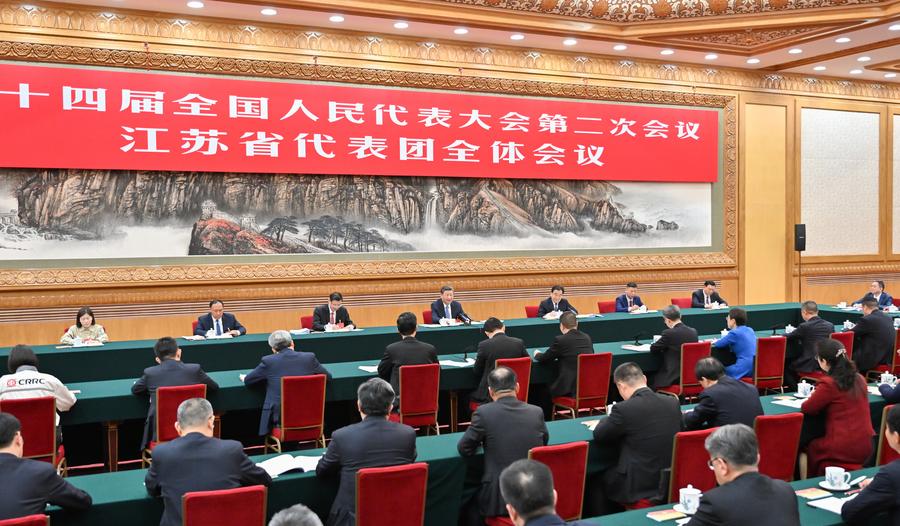
Xi is well-acquainted with the challenging situation faced by private enterprises. He instructed the establishment of a private economy development bureau under the country's top economic planner to provide assistance to private enterprises facing difficulties.
Xi also emphasized the need to promote financial reforms to facilitate financing for private enterprises. He stressed the importance of encouraging private capital to enter industries and sectors where entry is not explicitly prohibited by laws and regulations.
Under Xi's instruction, the system of a negative list for market access was comprehensively implemented, allowing entry into areas not explicitly prohibited by the list. By the end of 2023, the number of registered business entities nationwide reached 184 million, more than three times the figure in 2012.
From 2012 to 2023, the number of private enterprises in China more than quadrupled, and the proportion of private enterprises in the total number of enterprises increased from less than 80 percent to over 92 percent.
During that period, privately-owned banks received approval for establishment, a high-speed rail controlled by private capital began operation, private investment was permitted to enter the oil and gas exploration and production sector, and a private rocket company achieved success in launching a rocket from the sea.
While reinforcing the Party's leadership, Xi initiated market-oriented reforms for state-owned enterprises (SOEs). In 2017, China Unicom, as the first centrally-administered SOE in the telecommunications industry to open up to private capital, introduced 14 strategic investors, including internet titans Tencent, Baidu, JD.com, and Alibaba, in the "mixed-ownership reform."
A three-year action plan for SOE reform converted SOEs into limited liability companies or companies limited by shares. Some 38,000 SOEs established boards of directors.
International media have noticed that China's reform has been advancing in step with changes in the situation. A trade war waged by the United States, the global pandemic, and increased geopolitical tensions have tested the resilience of China's economy. The country is also transforming its economic development model.
Xi has led China to accelerate building the new development pattern, which takes the domestic market as the mainstay while allowing domestic and international markets to reinforce each other.
A key support for this strategy is the establishment of a unified national market. To achieve this, a series of reforms are being implemented to eliminate local protectionism and dismantle regional barriers.
Xi has made "institutional opening-up" a priority. In one such move, China has lifted foreign ownership limits for securities companies, management companies of securities investment funds, futures companies, and life insurance companies.
Meanwhile, he is cautious about disorderly capital expansion, market manipulation, and pursuit of exorbitant profits in certain areas. He said it harms the interests of the people.
He proposed setting "traffic lights" for capital flows, ensuring that "financial magnates" do not act unscrupulously while still allowing capital to function properly as a production factor.
This indicates that China's reform is no longer solely focused on growth but considers a more balanced approach.
Under Xi's leadership, China has effectively addressed risks in shadow banking and internet finance. Efforts have been made to resolve debt risks associated with local governments and major enterprises like China Evergrande Group. These moves safeguarded the interests of the people and ensured the smooth operation of the market.
MAKING PEOPLE'S PRIORITIES HIS OWN
Xi emphasizes that the ultimate goal of reform is for the people's well-being. He has pledged to make people's priorities his own and act on their wishes. This is different from the "capital first" stance.
He recognized that after more than 30 years of reform and opening-up, the principal contradiction facing Chinese society had undergone significant changes. "What we now face is the contradiction between unbalanced and inadequate development and the people's ever-growing needs for a better life," Xi said in 2017.
In response to this change, he advocates for coordinated and shared development, and is committed to achieving Deng's vision of "common prosperity."
When Xi assumed the Party's top post, there were significant disparities between China's eastern and western regions, and wealth inequality was severe.
He has transformed the poverty relief strategy, implementing "targeted poverty elimination." In less than 10 years, China eradicated absolute poverty in rural areas, a problem that had persisted for thousands of years in the country.
In April 2012, just months before Xi took the top office, a tragic incident occurred in Beijing's neighboring Hebei Province, where a farmer cut off his leg by himself due to illness and concerns over unaffordable medical treatment. Many impoverished farmers had few ways to deal with serious illnesses at that time.
Xi has initiated reforms in the rural healthcare system to ensure that people in the vast rural areas have access to medical treatment. The campaigns have significantly reduced cases of illness-induced poverty. Almost all low-income people and individuals just lifted out of poverty in rural areas now have medical insurance.
China's reforms started in rural areas in the 1970s, and Xi's reform initiatives regarding agriculture, rural areas, and farmers encompass a broader range of changes.
He has established a sound mechanism for stable grain production to ensure that "China's food supply remains firmly in its own hands," improved the village business environment, and promoted rural revitalization across the board.
In the early 2000s, Xi proposed in an academic paper bold reforms to the household registration system to eliminate various social and economic disparities as well as the division of the urban and rural labor markets caused by the system.
At that time, there was considerable controversy over whether or not to abolish household registration restrictions.
In 2016, the central government rolled out a plan to grant urban residency to some 100 million people from rural areas and other permanent residents without local household registration, which was fulfilled ahead of schedule.
During an inspection trip to Shanghai in 2023, Xi visited the apartments where migrant workers lived. He was happy to learn that migrants were settling down in the metropolis.
"Great! Stay, settle down, and strive for a better life," he said.
Under Xi's leadership, China scrapped the reeducation-through-labor system, which had been in operation for over half a century.
In response to demographic changes, China has adjusted its population and family planning policies accordingly. Reforms have been carried out to ensure better and more equitable education. Additionally, Xi has spearheaded the establishment of the world's largest social security system and initiated reforms in basic elderly care services.
With a belief that "people's health is the primary indicator of modernization," Xi called for studying and promoting the practice in the city of Sanming in Fujian to address the challenge of healthcare reform.
Xi advocated for the comprehensive elimination of markups on drugs and medical consumables that had been in place for over 60 years, reducing patient healthcare costs. Government departments acted on his call and formed a work team to negotiate drug and consumable prices with pharmaceutical companies.
In a widely circulated online video of price negotiation in 2021, representatives from the National Healthcare Security Administration insisted that "no minority group of patients should be abandoned," and managed to cut the price of a life-saving drug for a rare disease from about 700,000 yuan per shot to 33,000 yuan per shot after eight rounds of intense negotiations.
This drug was then included in China's medical insurance catalog, igniting hope for over 30,000 patients nationwide. Similar price cuts for hundreds of drugs have cumulatively saved the public some 500 billion yuan in medical expenses.
Xi has a fascination with history and culture and is a frequenter of museums, having visited almost all of the museums in Beijing during his childhood.
Over the past decade, China has significantly increased funding for cultural relics preservation, sparking a cultural and museum boom nationwide. There are over 3,300 public libraries and more than 10,000 cultural centers and museums nationwide. Tickets for museums are often in high demand, especially during holidays.
Xi's reform in the cultural sector emphasizes enriching the "spiritual world" of the people as an essential requirement for Chinese modernization. This involves refining cultural industry planning and policies, and nurturing new cultural business forms and cultural consumption patterns.
As a result, the film industry has seen fast development in recent years. The number of cinema screens in the country has multiplied from about 13,000 in 2012 to over 86,000 now, the highest on Earth.
Another ground-breaking reform led by Xi occurred in the ecological domain.
When Xi took office as the general secretary in 2012, environmental pollution was one of the most common complaints among the public. At the start of that year, a river in Guangxi Zhuang Autonomous Region reported cadmium pollution, endangering the drinking water safety of over a million people. Several high-profile "not-in-my-backyard" incidents occurred across the country during the year.
Xi, known for environmental initiatives in Xiamen to clean up Yundang Lake and in Hangzhou to protect West Lake, established the Ministry of Ecology and Environment, set ecological and environmental protection as an inviolable "red line," introduced inspections on ecological and environmental protection by central authorities, and asked local officials to be responsible for the protection of rivers, lakes and forests as their "chiefs."
Under Xi's leadership, China became the country with the fastest improvement in air quality, the largest increase in forest resources, and the largest area of afforestation globally. The country has also held a steady position as the world leader in installed capacities for hydro, wind, solar, and biomass power generation amid his campaign to revolutionize the energy field.
China has also developed the world's largest carbon market and vowed to achieve carbon neutrality after carbon peaking in a much shorter time than developed countries. "Green and low-carbon development is the order of the day, and those who follow it will prosper," he said.
Xi believes that protecting the environment and ecology is vital to sustaining the Chinese nation's development and is also crucial for protecting the Earth, which is "our one and only home."
FORGING AHEAD WITH COURAGE
"No other country around the world can comprehensively advance reform in the same way as present-day China does, with a commitment to its promises and a sense of urgency," said a report by the Singaporean newspaper Lianhe Zaobao.
According to the 2023 Edelman Trust Barometer, a survey by consulting firm Edelman, China's overall trust level was 83, ranking first among all surveyed countries.
China was the only country among those surveyed that expressed optimism about economic prospects, according to the survey.
Observers believe that it is because Xi himself is the helmsman of reform in the new era that the socialist market economy heralded by Deng can continue.
Xi has ignited the engine propelling China on an irreversible journey toward modernization.
This is undoubtedly one of the most far-reaching reforms in human history. In the early 1990s, Deng's proclamation of "development is the absolute principle" liberated and developed China's social productive forces, enhancing China's comprehensive national strength.
Xi has held that high-quality development is the unyielding principle of the new era, and initiated a comprehensive and systematic transformation in China, which has contributed to the re-balancing of the world economy.
He has advocated for building a world economy that is innovative, invigorated, interconnected and inclusive, injecting new vitality into global development.
Last year, China's economy grew by 5.2 percent, contributing one-third of global growth. The country's economic engine remains strong. The "next China," according to many analysts, is still China, when looking for investment destinations.
What and how will China reform in the future? The question is drawing worldwide attention.
Reforms aimed at promoting new quality productive forces will bring about a new emancipation of the mind. Zhao Zhenhua, director of the Department of Economics of the Party School of the CPC Central Committee, said that fostering new quality relations of production that adapt to new quality productive forces is indeed a profound revolution, involving elements such as ownership of means of production, distribution, and people's positions in production.
This year's "two sessions" sent the signal that China plans to establish "pilot reform zones for building a high-standard socialist market economy." The goal is to foster "a world-class business environment that is market-oriented, law-based, and internationalized," where SOEs, private businesses, and foreign-funded companies all play an important role in China's modernization drive.
In addition, new reform measures will be introduced to foster new industrial growth engines, promote consumption growth, expand the middle-income group, and ensure equal access to basic services. These initiatives are expected to further unpack tremendous business opportunities in a market of over 1.4 billion people.
China is pushing for accession to the Comprehensive and Progressive Agreement for Trans-Pacific Partnership.
A Ministry of Commerce spokesperson said that China is willing to deepen reforms continuously, strive to meet the high standards required by the agreement, and make high-level opening-up commitments beyond its existing practices in the area of market access.
There are reasons to be optimistic about the prospects of reforms under the leadership of Xi.
This optimism is not only based on China's enormous economic and market size but also the unified leadership of the Party with Xi at the core. The CPC has the guts for self-reform and is capable of turning blueprints into concrete actions.
Furthermore, China is still a developing country with substantial growth space and potential.
Some Western observers perceive China's growing economic strength as a threat and China's large market as a "tool of economic coercion," fueling the attempt to decouple with or impose a blockade on China. These views need to be changed.
China's reforms are not intended to change or challenge the world order. Instead, the country is actively engaging in and impacting global economic governance, upholding fairness and justice on the world stage.
Xi has inherited and carried forward Deng's legacy through comprehensively deepening reform. This not only created economic miracles but also displayed the charm of the Chinese culture, contributing to the creation of a new form of human civilization.
"Our modernization is both the most challenging and the greatest," said Xi. "This is an unprecedented path, but we will continue to explore it and forge ahead with courage."
(by Xinhua writers Wang Jinye, Zhang Zhengfu, Cheng Yunjie, Wang Xiuqiong, Xu Lingui, Zhang Zhongkai, Shi Hao, Wang Yaguang, Zhang Bowen and Fu Min)■




